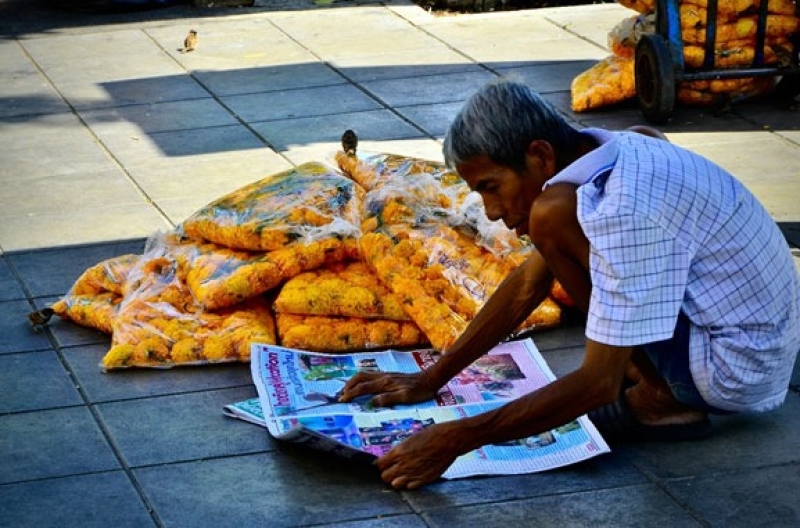- Heads of Sonali Bank, IDRA, and SBC resign citing personal reasons |
- Fakhrul calls attack on Iran 'horrible' |
- AI Moves Closer To Decoding Human Thoughts |
- UNESCO Calls Iran School Strike Grave Violation |
- Oil Jumps, Asian Stocks Slide On Gulf Tensions |
Asia-Pacific Leads on Inclusive and Climate-Resilient Social Development

An elderly man reads a newspaper while working on a street in Bangkok. Social protection is a safety net for vulnerable groups to ensure quality living.
The Second World Summit for Social Development, held in Qatar earlier this month, marked a key moment for global efforts to advance inclusive, equitable, and sustainable development. Contributions from the Asia-Pacific region demonstrated that diversity is a strength in crafting people-centred solutions.
Countries showcased innovative approaches to social protection, intergenerational solidarity, care economy transformation, and poverty reduction. Rooted in local realities and scaled through regional cooperation supported by ESCAP, these initiatives offer valuable lessons for the world.
Climate-Resilient and Inclusive Social Protection
Social protection is a powerful tool for reducing poverty and inequality. With the right investments and reforms, it can drive equitable development, especially as countries face climate-related risks.
Indonesia’s Program Keluarga Harapan has helped households improve livelihoods and coping capacities in climate-sensitive sectors such as food systems and natural resource-dependent activities. Public work programmes, such as Fiji for Jobs 2.0 and India’s Mahatma Gandhi National Rural Employment Guarantee Scheme, help rural households adapt to climate shocks while creating resilient community infrastructure.
In Nepal, forecast-based financing allows pre-defined early actions, including social protection transfers, before disasters occur, reducing the impact on vulnerable communities.
Intergenerational Solidarity
Demographic shifts across Asia-Pacific demand new approaches to social cohesion and equity. The Maldives launched its National Policy on Ageing in September 2025, while Laos recently adopted a decree and policy on ageing. These initiatives highlight the importance of viewing youth and ageing as interconnected stages, promoting solidarity across generations. ESCAP supports countries in sharing best practices and strengthening regional cooperation.
Transforming the Care Economy
Valuing unpaid care work and investing in the care economy are central to building inclusive, resilient economies. Malaysia’s Selangor state introduced a comprehensive care policy in 2024, covering home-based caregiver training and childcare subsidies. The Philippines has embedded care programmes into local budgets, reaching vulnerable women.
The Republic of Korea expanded its parental leave system with the “6+6 scheme,” encouraging shared caregiving responsibilities and fathers’ participation during a child’s first year.
Regional Collaboration: Scaling Solutions Across Borders
A key message from the Summit was the importance of regional cooperation. Diversity has enriched progress across Asia-Pacific. The Action Plan to Strengthen Regional Collaboration on Social Protection has facilitated resource mobilization and knowledge sharing. The Doha Political Declaration proposes a regional mechanism to monitor commitments, ensuring accountability and continuous learning.
ESCAP will continue supporting the follow-up of the Declaration, providing spaces for dialogue, policy coherence, and strengthening national statistical systems to track progress toward the 2030 Agenda.
Asia-Pacific Leading the Way
The region has shown that sustainable and inclusive social development is achievable through locally grounded, regionally coordinated, and forward-looking action. From care to climate and youth to ageing, Asia-Pacific solutions are shaping a future where no one is left behind. The region’s commitment to equity, resilience, and human dignity sets a model for global social development.

